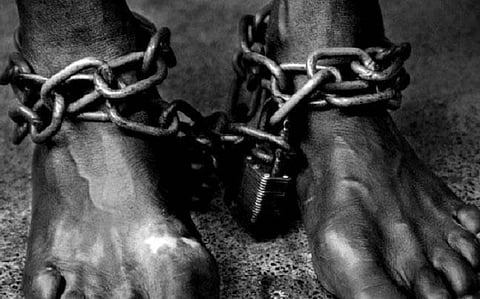

Over a week ago, 32-year-old Jyothi, her 15-day-old son and two of her daughters were rescued from bonded labour in Bengaluru. Jyothi’s family had to run from pillar to post just to file a complaint with the local police and finally, on Monday, they met with Deputy Commissioner of Police Rahul Kumar and submitted a complaint.
The DCP directed the jurisdictional KG Halli Police to register an FIR. However, when Jyothi went to the police station to file a complaint, the building contractor Jaysilla, who is accused of enslaving Jyothi and her family members was also present at the station.
“The police mediated a settlement between Jyothi and Jaysilla. Both parties agreed that a case would not be registered and that Jaysilla would not threaten or bother Jyothi. The social worker Habeebullah, who rescued them has promised to keep an eye on Jaysilla,” said Kalimullah, a social worker, who had taken Jyothi to Bowring Hospital, on April 26, the night she was assaulted by Jaysilla’s goons.
Why FIRs are rarely registered in bonded labour cases
Sources in the KG Halli Police station say that the Inspector convinced Jyothi that going through legal procedures would be tedious and that it would be better for her to settle the case outside of court.
Speaking to TNM, Shantanu Dutta, Spokesperson for the National Coalition to Eradicate Bonded Labour and Human Trafficking says that in many cases of bonded labour, an FIR is not registered and the other cases almost never reach the court.
“The FIR is not filed for a variety of reasons. Firstly, it may be because the police officials see bonded labour cases as those of labour violations. They are not made aware of how to investigate such cases as they do not know what the law says. Secondly, in most cases, the person enslaving the victims have connections and they persuade the police to mediate and settle the matter, like in Jyothi’s case,” he said.
Another reason, Shantanu maintains is that the victims constantly migrate and the police do not want to go into the trouble of tracking them down during the trial. “The police also convince the victims that going through the trial would take years and that it would drain them financially to pay for the legal proceedings,” he said.
Conviction rate in bonded labour cases is drastically low
Speaking to TNM, Balan, a public prosecutor practicing in Karnataka for 30 years says that police officers are not trained properly and lack knowledge about the Bonded Labour System (Abolition) Act 1976. He says that the police do not follow required procedures to gather evidence, which leads to acquittals.
In most cases of bonded labour, where FIRs are registered, another issue causes the trial to fall flat – inaccurate chargesheets. Balan says that the police rarely inform the Labour Department or the Deputy Commissioners of the concerned districts and obtain a release certificate.
“The DC has to give a release certificate and this document is evidence that the victims were in fact victims of bonded labour. The DC has to conduct a preliminary probe before issuing the RC. Most chargesheets do not have this document,” Shantanu says.
Another impediment to convictions in cases of bonded labour, he says are the inordinate delays in the legal proceedings.
“The chargesheet is filed may be six months or a year after the rescue happens. The police do not look into the trafficking element and track down all the people involved in the nexus of bonded labour. They only arrest the person who enslaved the victims and more often than not, the accused get bail. They do not trace call records or try to connect the dots or procure evidence as to how the victims ended up in such a situation. Lack of evidence always give the accused reasonable doubt and hence leads to acquittals,” he added.